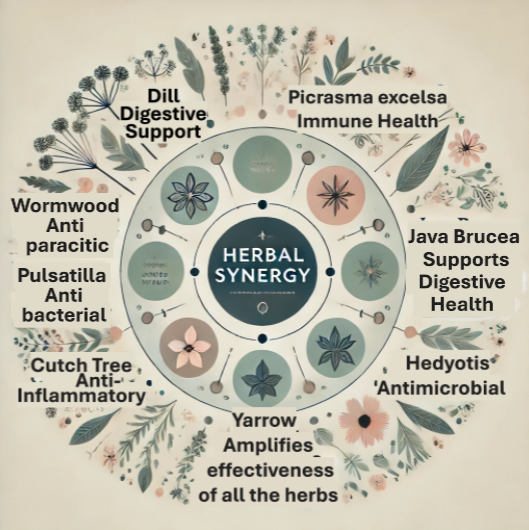

In today’s fast-paced world, digestive health often takes a back seat, leading to a host of uncomfortable symptoms like bloating, gas, or even more serious issues like bacterial overgrowth or parasitic infections. While modern medicine has its merits, ancient herbal remedies have stood the test of time for good reason. Herbs such as dill, wormwood, and yarrow, among others, bring a unique synergy of digestive, antimicrobial, and anti-inflammatory properties to support your gut, liver, and immune health.
Dr. J always emphasizes a root-cause approach, addressing imbalances at their core while working with nature’s time-tested solutions. Let’s dive into eight powerful herbs and their unique benefits.
Traditional Uses: A favorite in both culinary and medicinal circles, dill has long been prized for its ability to ease digestion, reduce gas, and support liver function.
How It Works: Dill contains volatile oils like carvone and limonene, which promote the secretion of digestive juices, making it easier to break down food. It also relaxes intestinal muscles, helping to alleviate bloating and cramping.
Additional Benefits: Dill may also play a role in urinary health by acting as a gentle diuretic, helping the body flush out toxins.
Traditional Uses: Known for its anti-parasitic properties, wormwood has been a staple in herbal medicine for centuries. It also offers benefits for digestive health and inflammation.
How It Works: Wormwood contains compounds like artemisinin and thujone, which are toxic to parasites, making it highly effective for cleansing the gut. Its bitter profile also stimulates bile production, supporting better digestion and nutrient absorption.
Additional Benefits: Wormwood’s antimicrobial and anti-inflammatory properties make it an excellent choice for gut dysbiosis or bacterial overgrowth.
Traditional Uses: This herb has been used in Chinese medicine for centuries to address digestive issues, particularly dysentery, and even tropical diseases like malaria.
How It Works: Java Brucea’s active compounds include quassinoids, which have potent anti-inflammatory and antimicrobial properties. These help reduce gut irritation and support healthy digestion.
Additional Benefits: Java Brucea shows promise in promoting intestinal integrity and helping manage diarrhea or other digestive disorders.
Traditional Uses: Pulsatilla is another key herb in Chinese medicine, known for its antibacterial and gut-soothing properties. It is particularly useful for addressing dysentery.
How It Works: Pulsatilla contains anemonin and saponins, which inhibit harmful bacterial growth while reducing inflammation in the gut lining.
Additional Benefits: Its antibacterial properties make it effective for tackling gastrointestinal infections, supporting a healthy gut microbiome.
Traditional Uses: Often used for its immune-boosting and gut-supporting properties, Picrasma excelsa is recognized for its antibacterial, antifungal, and antiviral effects.
How It Works: The herb’s quassinoids target harmful microbes while promoting bowel regularity. It also supports the liver, aiding detoxification.
Additional Benefits: By enhancing immune resilience, Picrasma excelsa serves as a versatile herb for combating infections and improving overall wellness.
Traditional Uses: Acacia catechu is widely used in Ayurveda and traditional medicine for gastrointestinal discomfort and inflammation.
How It Works: Rich in polyphenols such as catechins and tannins, the Cutch Tree helps soothe inflammation in the gut lining, reduce oxidative stress, and support intestinal integrity. Its astringent properties also make it effective for managing diarrhea.
Additional Benefits: Beyond digestive health, Acacia catechu has been shown to support oral health and wound healing, making it a versatile addition to natural health protocols.
Traditional Uses: In traditional Chinese medicine, Hedyotis diffusa has been used for its potent antimicrobial properties, especially against bacteria that may develop resistance to conventional treatments.
How It Works: This herb disrupts bacterial membranes, weakening pathogens and making them more vulnerable to the immune system. Its anti-inflammatory effects further support gut health by reducing irritation in the gastrointestinal tract.
Additional Benefits: Hedyotis diffusa may also play a role in preventing bacterial resistance, making it an effective ally in combating drug-resistant infections.
Traditional Uses: Known as a medicinal herb for thousands of years, yarrow is revered for its ability to amplify the effects of other herbs in blends while also offering digestive, anti-inflammatory, and fever-reducing benefits.
How It Works: Yarrow contains flavonoids and alkaloids that help regulate stomach acid production, improving digestion and reducing bloating. Its anti-inflammatory properties soothe the gut lining and help calm discomfort.
Additional Benefits: Yarrow’s versatility makes it beneficial for treating fevers, mild infections, and even menstrual discomfort.
Individually, these herbs provide powerful support for digestive health, immunity, and inflammation. However, when used in synergy, they offer even greater benefits:
These herbs may benefit individuals dealing with:
As always, consult with a healthcare provider to determine the best approach for your unique health concerns.
While these herbs are generally safe when used appropriately, some individuals may need to exercise caution:
Nature has provided us with an arsenal of remedies to support optimal health. By incorporating herbs like dill, wormwood, and yarrow into your health routine, you’re giving your body tools to maintain balance, fight pathogens, and repair itself naturally.
As Dr. J often reminds us: “Healing begins with addressing the root cause. These herbs are here to guide your body back to balance.”
=======================
Recommended Product: